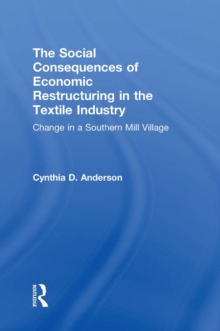
Social Consequences of Economic Restructuring in the Textile Industry : Change in a Southern Mill Village PDF
by Cynthia D. Anderson
Part of the Transnational Business and Corporate Culture: Problems and Opportunities series
Description
This book analyzes the dramatic social impacts of global economic restructuring in the US textile industry and the consequences for Southern textile mill communities.
With the expansion of markets in the global economy, government policies such as NAFTA and GATT are greatly affecting the domestic production of textiles.
Increased global competitiveness has led to technological modernization, plant shutdowns, and downward pressure on wages.
Many family-owned companies are merging into conglomerates, some of which are international.
Concurrently, the structure of power and domination in Southern textile communities is changing.
Paternalistic control, typically portrayed as a form of traditional authority and benevolent protection of workers, is no longer dominant.
With the decreased need for skilled labor, textile company owners are not obligated to provide mill villages with housing electricity, and water.
Formerly protected communities are now players on an international scale, with workers competing for jobs on a global level.
New forms of class exploitation, racism, and sexism provide a contested terrain for mill employees. As the industry restructures, workers and their households are faced with new challenges.
To understand these social impacts, I examine globalization, restructuring, and spatialization as processes embedded in multiple layers of reality.
The multi-level analysis focuses on the Southern textile industry, a leading firm, its surrounding labor market area, and members of the community.
Historical, statistical and qualitative interviewing methods yield data that demonstrate redefined labor markets, reconstituted race relations, and household adaptations.
Changes in firm and industry impact shop-floor labor processes, including increased production pace, new management strategies and technological adjustments.
As embedded layers of social relations, the multi-level outcomes are both negative and positive, creating new winners and losers in Southern communities.
Information
-
Download - Immediately Available
- Format:PDF
- Pages:184 pages
- Publisher:Taylor & Francis Ltd
- Publication Date:04/02/2014
- Category:
- ISBN:9781135703783
Other Formats
- Hardback from £59.99
- EPUB from £29.69
- Paperback / softback from £16.99
Information
-
Download - Immediately Available
- Format:PDF
- Pages:184 pages
- Publisher:Taylor & Francis Ltd
- Publication Date:04/02/2014
- Category:
- ISBN:9781135703783









